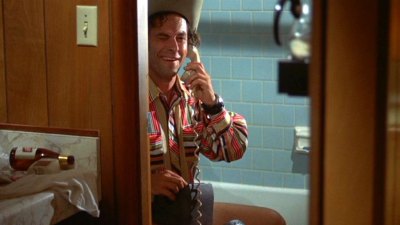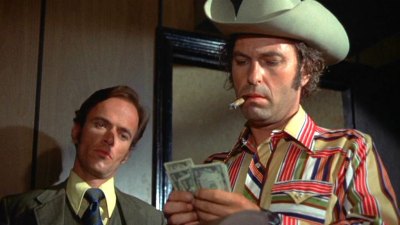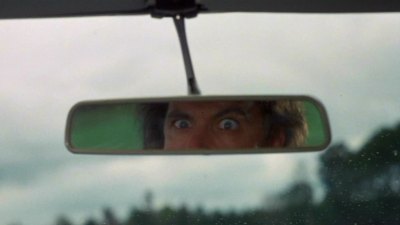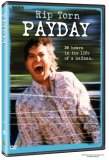| Reviews & Columns |
|
Reviews DVD TV on DVD Blu-ray 4K UHD International DVDs In Theaters Reviews by Studio Video Games Features Collector Series DVDs Easter Egg Database Interviews DVD Talk Radio Feature Articles Columns Anime Talk DVD Savant Horror DVDs The M.O.D. Squad Art House HD Talk Silent DVD
|
DVD Talk Forum |
|
|
| Resources |
|
DVD Price Search Customer Service #'s RCE Info Links |
|
Columns
|
|
|
Payday (1973)
Payday, Rip Torn's 1973 drama about 36 hours in the life of a lower-tier rat bastard of a country singer, is one of those barely-seen films that people have been talking about for years. Those who stumbled upon it during its original limited run never forgot it, and a small but steady underground rumble has kept the title in that rarified category of "never seen cult classic" for over thirty years. Now available on disc from Warner Bros., Payday more than lives up to its reputation, showcasing Torn's finest film performance, while screenwriter Don Carpenter and director Daryl Duke create an indelible portrait of the grimy, pointless life of a second-rate country performer, endlessly roaming the back highways of the American South.

Torn stars as Maury Dann, a lower mid-level country singer who's had one charted hit, and who wants to keep the cash coming in from endless tours of one-night stands. His manager, McGinty (Michael C. Gwyne), a cold-eyed hustler and fixer, wants Maury to stay put after his latest gig, in the hopes that a faintly promised opening on an upcoming Johnny Cash TV special might come to fruition, kicking Maury up a substantial notch on the ladder to success. But disdainful, arrogant Maury isn't having any of that "waiting;" if the offer is solid, he'll hang around. But otherwise, he restlessly wants to get back on the road, and hustle up whatever cash he can from honky-tonk gigs.
Traveling at breakneck speed in his chauffer-driven Cadillac while McGinty and the band follow up in a beat-up station wagon, it's apparent why Maury wants to stay on the road. Ensconced in his backseat cocoon, Maury can indulge in any manner of drugs, alcohol, firearms or women without regard for propriety or the law, while the wasted, abandoned landscapes of Alabama fly by his window. Ruthless to the core, and totally insensitive to the feelings of anybody else, Maury rules his pathetically small kingdom with an absolute iron hand. When he calls for a gun - even when it's to shoot maniacally at his own band's wagon - the pistol is handed over without comment. When he decides to bring another girl, Rosamond (Elayne Heilveil), along for the ride, his current girlfriend Mayleen (Ahana Capri) may complain, but not too much. She even sits idly by, as Maury makes love to Rosamond - right next to her.
But events quickly spiral out of control for Maury. Lacking any sleep and keeping himself awake with uppers, he starts to lose his grip on the false world he's created. In an encounter with a powerful local DJ, he's subtly threatened to attend a local event he wants no part of. He has a run-in with a drunken businessman whose girl Maury stole away, a run-in that McGinty temporary fixes, but which will come back to haunt Maury. Getting rid of Mayleen because she dares tell him what to do, he also fires his friend Bob (Jeff Morris), visits his pill-addicted mother (Cara Dunn) who's let his hunting dog almost starve to death (he brings her a big bag of bennies to shut her up), and finally realizes that the cops aren't going to leave him alone over that previous nasty business with that outraged boyfriend. The only escape for Maury is flight in his Cadillac.
BIG SPOILERS ALERT!
Written by cult writer Don Carpenter (Hard Rain Falling, A Couple of Comedians) and directed by future cult director Daryl Duke (his 1978 Canadian thriller, The Silent Partner, would, like Payday, be similarly lauded by critics and the few patrons who saw it during its original run), Payday is creepily relentless in presenting a "hero" who is the very antithesis of the romantic "anti-hero." Forget Paul Newman's charming, handsome snake who women loved to dread in Hud; Rip Torn's Maury Dann is the real article: an utterly cold, calculating, merciless son of a bitch who uses men and women like Kleenex without the slightest regard for anything approximating human emotion. Sweaty, unkempt, and not particularly handsome, Maury gets his women like any other business transaction: he has a certain measure of low-wattage fame, and the searching, emotionally bankrupt women who hook up with him, get a momentary charge out of their lives. When Mayleen tells Maury, right before sex, that, "I love you, sweet man," he replies in a courtly/astonished/condescending manner, "Thank you, dear." But the minute the act is over, they're at each other like cats, bitching at each in the most naked, hurtful fashion. "Sentiment" or even "common courtesy" are simply tools, not true emotions, to be used by the sociopath Maury to get what he wants, whenever he wants.
Quite a few times in the film, director Duke gives us a close-up of Torn putting on a fake smile and a wink in an effort to ingratiate himself with whomever he's trying to use, and it works - for a moment. But everybody in Payday eventually learns that it's a grotesque dodge by Maury, a grinning mask used by the user to get what he wants, and no more. The film is quite remarkable in showing the audience right from the start that this man is toxic, that he has no redeeming values, and that for the next 103 minutes, they're going to see a man spiral out of control without a hint of sympathy given to him. Each scene is set up in such a way as to whittle down any preconceived notions we might have about the "anti-hero" who we keep wishing has something in his make-up or background for us to hang-on to, or to show even the smallest sign of humanity. Carpenter and Duke and Torn are having none of that. Maury's crushing emotional blankness, the pointlessness of his life, and his mean-spirited search for the next sensation, overwhelm the viewer with an unrelenting depression, until we realize there's nothing of conventional value in Maury's world. It's about as bleak a movie world as I've encountered.

Everybody, but everybody, is compromised or a user or an unsympathetic victim in Payday. When watching good "friend" Bob try to help Maury's starving, neglected dog, we start to admire his character...until we remember that he raped Rosamond the night before. Maury's mother seems hazy and forgotten in her ramshackle farmhouse, and we pity her because oblivious Maury brings a magazine to read while she complains of no energy, no purpose in life...until we find out her laments were just a submerged plea for Maury's bag of uppers (the sight of his mother, blasted out of her mind, trying to hang up laundry, is at first funny, and then terribly sick). McGinty, the character we might like because he's so efficient and "professional," characteristics we might elevate among all the wasted souls in Maury's world, is in reality nothing more than a pimp, a hollow-eyed fixer who buys off people when things become inconvenient for Maury. When Maury kills the drunken businessman in self-defense, Maury casually tells McGinty to "fix it," which McGinty does by offering up chauffer Chicago (Cliff Emmich) as the fall guy, and who is then promptly forgotten and replaced. Even Rosamond, who's at first portrayed as some kind of innocent, quickly moves from Bob (who remember, raped her) to Maury, going so far as to let Maury sleep with her in the backseat of the Caddy, with Mayleen sitting right next to them (the shock close-up insert of Mayleen watching them, with the audience knowing she's only inches away, is quite amazing).
Indeed, in what is probably the film's best scene, Mayleen challenges Maury's authority by continuing to argue with Rosamond, giving Maury the excuse he's needed to finally get rid of her. Screeching for the car to halt (Chicago almost turns the car into the ditch when he immediately complies), Maury kicks Mayleen out on a deserted back road. The car pulls away and stops, and we think he's changed his mind. But he hasn't; the car backs up and he throws out a wad of money for her, setting us up again to think, well; at least he's partly human. He's given her something for her troubles. But nothing is as expected in Payday. The car speeds off, only to back up yet again, with Maury taking back the money that's still laying at Mayleen's feet, contemptuously telling her, "You haven't earned it." Total shock. And a brilliant play on the audience' expectations of how movie "anti-heroes" work. Naturally, Duke and Carpenter top themselves by ending the scene with the unsympathetic Mayleen immediately picking up another ride with another man; she's a hard-bitten, callous survivor, with no illusions about this guy, either. No one gets off the hook in Payday.
Another remarkable aspect of Payday is the tremendously claustrophobic feel it has, despite the fact that it is, in essence, a "road picture." Keeping tight close-ups on the cast, much of the action takes place in the back of that semi-grungy Cadillac. Showcasing perhaps the best film depiction of the nuts and bolts aspects of the relentless touring that goes along with being a low-level country singer, director Duke doesn't indulge in the beautiful panoramic vistas of America that softened Easy Rider. The wasted plains of Alabama look overheated and under-populated as they whiz by Maury's window. Indeed, there's no celebration at all of "the journey" in Payday; travel is pointless and uncomfortable for Maury - as well as a pathetic escape whenever he can't handle the latest set-back in his life. The ending, with Maury maniacally driving away from his troubles when he realizes he'll go down for murder, is probably the greatest anti-romantic antidote to the clichéd "road picture" I've ever seen. With nowhere to run to, Maury flies along a dusty farm road (not at all unlike the kind of place he grew up in, he says, before he ran away from home), not at all aware that he only has minutes to live. It's a shocking ending (I won't describe it precisely), but totally in keeping with the utterly wasted life that is Maury Dann.
Everyone knows the story of Torn quitting Easy Rider, with the tellers frequently framing the tale in terms of "What if..." noting that Jack Nicholson became a star after taking over the role. But I've always felt that the same wouldn't have happened to Torn, just because I suspect he would have been a radically different George Hanson. Nicholson brings such a charming, maniacal, essentially likeable energy to his roles, it's no wonder he became such an audience favorite. Not so for Torn, who largely eschews such nods and winks to the audience in his roles (of course, the opposite is true for his best known role as Artie on The Larry Sanders Show, in which he did just that: charm the audience). Here, Torn does everything he can to totally alienate the audience. His great achievement in Payday is the fact that the surface tricks are all there to engender sympathetic "anti-hero" feelings from the audience for Maury - the winks, the smiles, the commanding smoothness when dealing with trouble - but Torn consistently undercuts them. Early in the movie, Rosamond searches for Maury in a suite of motel rooms - only to find him sitting on the toilet (would Newman ever had done that?). Always disheveled and frankly dirty and smelly looking, Torn's Maury is a physical wreck, a perfect outer manifestation of the rot and corruption inside the character, and nothing about Torn's performance softens that take for the audience. His voice either flat and mean or barking and mean, his beady eyes cold and malevolent, Torn is a wonder here of pure, manipulative, devious - and most frightening, blank - evil, and he never lets the character "off the hook" so we'll like him. It's his finest film performance, and one that hopefully will be far better known in the years to come.

The DVD:
The Video:
Payday comes to us in a very nice anamorphically enhanced, 1.78:1 widescreen transfer that may look at times dark or washed out, but which I suspect captures the original look of the film. Some small grain is apparent, but for such an obscure title that's rarely been shown, the transfer is quite sharp.
The Audio:
The Dolby Digital English English soundtrack is big, fat mono, which accurately represents the original theatrical presentation. English subtitles are included.
The Extras:
There's an informative but spotty commentary track by director Daryl Duke and producer Saul Zaentz (obviously recorded at two different times and then combined). Duke sounds quite ill (he died in 2006), and there are stretches where he doesn't speak. Zaentz is more loquacious, and he provides some nice background on the production. There's also the original trailer, which incorrectly tries to pass off Payday as some kind of redneck drive-in thumper, like White Lightening or Macon County Line - which it most decidedly is not.
Final Thoughts:
It's not surprising that audiences stayed away in droves from Payday. Sold as some kind of drive-in actioner, Payday is in fact a relentlessly depressing, grimly accurate view of the aimless, rootless wanderings of a low-watt country singer - who just also happens to be a thoroughly rotten son of a bitch. Rip Torn gives the performance of his career, and you'll not soon forget the claustrophobic, nightmarish world he inhabits from the backseat of his grungy Caddy. It's hard to call Payday a forgotten gem, because nobody saw it in the first place. But it stands with works like Fat City and Two-Lane Blacktop in depicting a seamy underbelly of America that most of us wouldn't care to know about or see. It's one of the most effective, searing dramas of the 1970s. I'm giving Payday our highest ranking at DVDTalk: the DVD Talk Collector Series rating.
Paul Mavis is an internationally published film and television historian, a member of the Online Film Critics Society, and the author of The Espionage Filmography.


|
| Popular Reviews |
| Sponsored Links |
|
|
| Sponsored Links |
|
|
| Release List | Reviews | Shop | Newsletter | Forum | DVD Giveaways | Blu-Ray | Advertise |
|
Copyright 2024 DVDTalk.com All Rights Reserved. Legal Info, Privacy Policy, Terms of Use,
Manage Preferences,
Your Privacy Choices | |||||||














